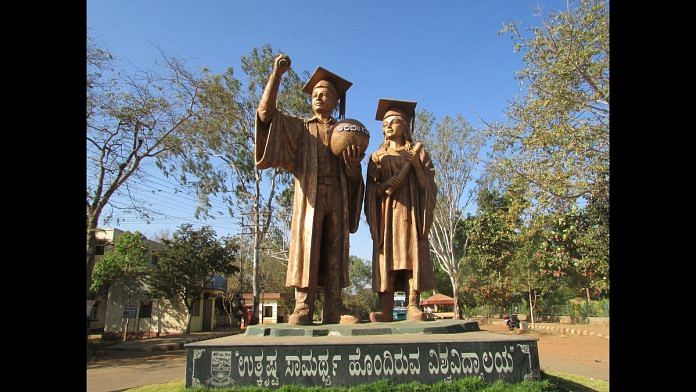Thank you dear subscribers, we are overwhelmed with your response.
Your Turn is a unique section from ThePrint featuring points of view from its subscribers. If you are a subscriber, have a point of view, please send it to us. If not, do subscribe here: https://theprint.in/subscribe/
In recent years, the Governor’s role as Chancellor of state-level universities has triggered differences with political executives in many states. Bills relating to it passed by State Assemblies are facing roadblocks in getting assent of the Governors.
The ongoing acrimonious debate in public and legislature is likely to even reach
courts. Therefore, it is worthwhile to objectively reflect back on the said issue and
ensure a more satisfactory governance at state-level universities, much required for
raising the standards of higher education.
The present system of appointing Governors as Chancellors of the public funded
universities in states has its roots in the historical background of colonial India. The
Governors of the three Presidencies were assigned the role of Chancellor for the first
three universities nucleated in 1857 by East India Company. The Viceroy of India
started to serve as the Chancellor at the Universities located at Calcutta, Madras,
Bombay, Lahore and Allahabad, setting a new precedence as the process was re-
commenced via the common Indian Universities Act (1904) for the then 5
universities. After independence, the role of the Viceroy as the Chancellor came to an
end. The position of Viceroy was replaced by the Governor-General of India, which
later transformed to the President of India, who functioned as the Chancellor/Visitor
of a few Central Universities. With the passage of time, the President of India as the
Visitor got assigned the responsibility of appointing the Vice Chancellors of the
Central Universities.
The power of Governor to function as the Chancellor of State Universities is not
explicitly mentioned in the Indian constitution under any specific article. Instead, it is derived from the colonial tradition, and it emanates from the general powers and
functions of the Governor as provided in Articles 153 and 154 of the constitution.
The office of the Chancellor as Chair of the Senates of the State Universities is
actually contained in the Statutes or Acts of individual universities, as framed with the
approval of the state governments. During the times of increasing political dichotomy,
state governments have tended to exercise their right to press upon Bills, which
replace the Governor as Chancellor to the Chief Minister. The irreconcilable
differences have led several states, like, West Bengal, Kerala, Gujarat, Telangana,
Maharashtra, Punjab, etc. to pass such Bills. Functionally, the system is in a state of
challenge because, in all such cases, assent to the Bill by Governor is being held in
abeyance.
Insulating the institutions of higher learning from political interference and state-
centre controversies, is of prime importance in contemporary India, hoping to take big
leaps globally, on the strength of higher education and academia-industry
partnerships. It is useful to recall the recommendations of the Sarkaria Commission
constituted by the Government of India in 1988 and the Punchhi Commission set up
in 2007 to look into the problems and issues in Centre-State relations, as they also
related to the governance of the State universities. The Sarkaria Commission had
recommended that state legislatures should avoid conferring statutory powers on the
Governor, which were not envisaged by the Constitution. The Punchhi Commission
observed that the proactive role of Governor as Chancellor may expose the august
office to controversies or public criticism. Hence, the role of the Governor should be
restricted to the constitutional provisions only.
Taking a cue from the Punjab Agricultural University Act (1962), one could argue that
University statutes should explicitly define the process of appointment of Vice
Chancellors and the constitution of Search -cum-Selection Committees (SSC) for
identifying highly learned academicians for this purpose. The regulatory bodies like
UGC and ICAR have from time to time called for carefully constituted SSCs for
making such appointments. A panel prepared by the SSC for the appointment of Vice
Chancellor, ought to be put up to the Chancellor, who should take a call on it in an
expedient manner. It is advisable that the present system of university governance
through the Governor as Chancellor be not altered.
The SSC could comprise some of the senior most members from the judiciary, like,
ex-Chief Justices of High Courts, ex-Judges of the Supreme Court, ex-Presidents of
the national science academies in different disciplines, Padma awardees in related
domain of a University, top academicians/ educationists/ national professors, serving
or former Chief Secretaries, ex-Secretaries of Govt. of India, former Vice Chancellors,
ex-Chairpersons of UGC, AIU, AICTE, ICMR, ICAR, etc.
A time limit for the completion of the process by the SSCs needs to be prescribed in
the statute of a given university to guard against delays in such appointments as often
witnessed in the recent past, and ad-hoc arrangements ought to be scrupulously
avoided.
These pieces are being published as they have been received – they have not been edited/fact-checked by ThePrint.

